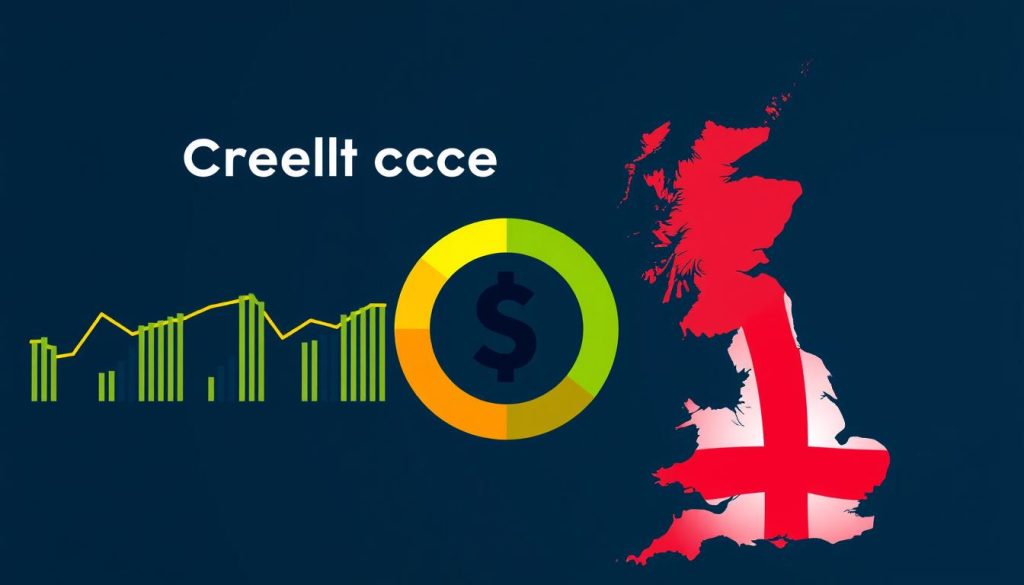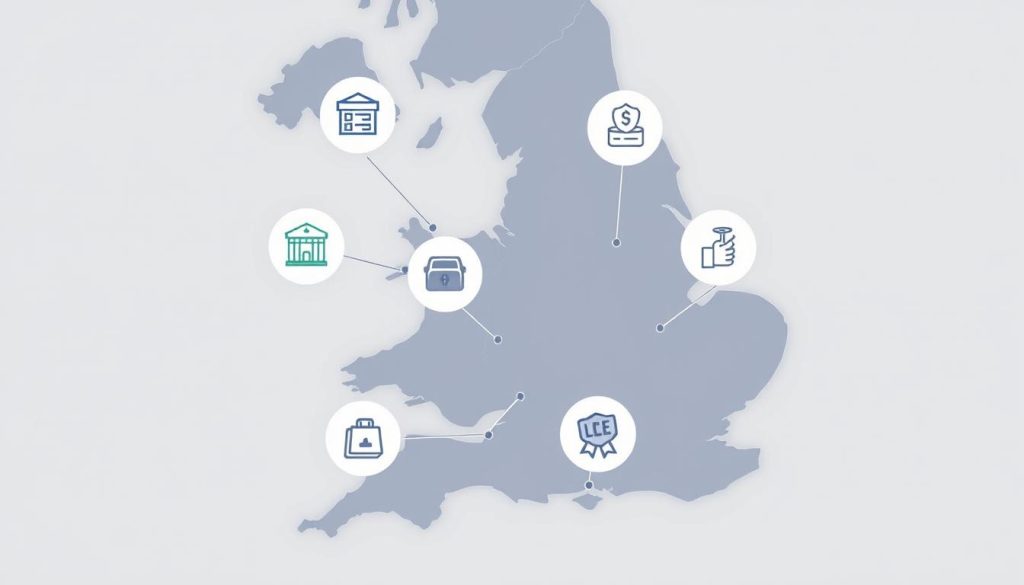Have you ever found getting money in the UK tough? Knowing how to get funds is key for money flow in life and business.
This guide looks at how to get cash, various financial options, and how to pick the right path. We cover everything from bank loans to government grants. You’ll learn how to choose wisely and confidently.
By finishing this guide, you’ll know the fund basics. You’ll learn how to keep your finances healthy and secure too.
Understanding the Basics of Accessing Funds

To know how to manage money well, learning about fund access is crucial. Banks and other financial bodies use many rules to decide who gets money. They look at things like how quickly you can turn assets into cash and if you’re good for paying back loans.
Being able to quickly turn something you own into cash is called liquidity. If you’re seen as someone who can pay back what you borrow, you’re creditworthy. Banks check this by looking at your credit score and past money behaviour.
A high credit score and a clean financial history help a lot. They make it easier to get things like loans and credit cards.
Understanding these points helps a lot in managing your money better. It’s key to know about different ways to save and grow your money. There are options like savings accounts, bonds, and mutual funds available.
Let’s use real-life examples to explain this. A savings account is great if you need to use your money fast. Stocks might grow your money more, but they come with more risk and it’s harder to get your money when you need it.
Knowing these basic things helps you make smarter money choices. It’s all about picking what’s best for your own money goals. Learning and understanding more about finances can lead to better financial security in the future.
The Role of Credit Scores in Fund Accessibility

Knowing the importance of your credit score is key in the UK to get funds. A good score opens doors to low-interest rates and easier loan approvals. A bad score, however, can really restrict your options. This guide will help you use and boost your credit score in the UK for better finance management.
How to Check Your Credit Score
It’s vital to keep an eye on your credit score to stay financially healthy. In the UK, you can get comprehensive reports from major bureaus like Experian and Equifax. Their websites let you request your credit report for free once a year. This helps you see your credit history, track changes and fix any mistakes.
- Visit the official site of a credit bureau, such as Experian or Equifax.
- Sign up for an account, if required.
- Request your credit report, which may involve answering some security questions.
- Review your detailed credit score and history once you receive the report.
Tips for Improving Your Credit Score
Boosting your credit score takes effort but brings great benefits. Here are tips to get a better score:
- Pay Bills on Time: Always pay your bills when they’re due. Late payments hurt your score.
- Reduce Debt: Work on lowering what you owe, especially on credit cards. Less debt improves your credit utilisation rate and score.
- Limit New Credit Applications: Applying for lots of new credit in a short time can damage your score. Apply wisely.
- Regularly Review Your Credit Report: Check your credit report for mistakes. If you find any, get in touch with the bureau to correct them.
- Register on the Electoral Roll: Being registered adds to your identity’s credibility and stability, improving your score.
Following these steps will help raise your score, making financial products and services more accessible. Keep proactive and careful with your credit profile for a brighter financial future.
Bank Loans: An Overview

Bank loans in the UK offer a range of options for diverse financial needs. Looking to buy a home, grow your business, or manage personal expenses? It’s key to know the different types of loans. This overview dives into the main types of bank loans. It shows their pros and cons to help you choose the right one.
Types of Bank Loans Available
Each type of bank loan in the UK serves a specific purpose:
- Personal Loans: Great for personal uses like home upgrades or consolidating debt. They have fixed interest rates and set repayment periods.
- Mortgages: Used for buying property. Mortgages have different interest rates and repayment times. They usually need a deposit and a detailed financial check.
- Business Loans: Aimed at helping businesses grow, buy equipment, or fund daily operations. These loans can be with or without collateral, with interest rates based on the risk.
Pros and Cons of Bank Loans
It’s essential to consider the pros and cons of each loan type in the UK. Here’s a quick comparison to help you:
- Personal Loans:
- Pros: Stable interest rates, predictable repayments, no collateral needed.
- Cons: Interest rates are higher than those for mortgages, and the available amounts might be limited.
- Mortgages:
- Pros: Beneficial interest rates, extended repayment terms, and the advantages of owning a home.
- Cons: You’ll need a deposit, there’s a foreclosure risk, and the application process is complex.
- Business Loans:
- Pros: Supports business expansion, offers flexibility in how you use the funds, and might have tax benefits.
- Cons: Sometimes requires collateral, tough criteria to meet, and comes with interest costs.
Credit Cards as a Source of Funds
Credit cards are easy to use and accepted everywhere. It’s important to know how to pick the best one for you. This includes understanding interest rates and fees to manage your money well.
Choosing the Right Credit Card
When picking a credit card, think about how you spend your money. Different cards offer different rewards, such as cashback or travel points. Pick one that matches your way of life. Here’s what to consider:
- Look for special deals, like 0% interest rates on purchases or moving your balance.
- See if their rewards, like cashback or points for flights, match how you spend.
- Think about the yearly fee and if the card’s benefits are worth it.
Understanding Interest Rates and Fees
Credit card interest rates and fees can add a lot to your debt. The Annual Percentage Rate (APR) shows how much it costs to borrow money each year if you don’t pay the full balance monthly. Also, keep an eye out for these fees:
- Annual Fees: Some cards charge a fee every year. This fee can depend on what the card offers.
- Late Payment Fees: Not paying on time can lead to extra charges and harm your credit rating.
- Foreign Transaction Fees: Using your card in another country might come with extra costs for changing money.
Knowing and managing these fees is crucial to avoid too much debt and keep your finances healthy.
Personal Loans vs. Payday Loans

Understanding the differences between personal loans and payday loans is key when you need funds fast. Each option impacts your financial health differently.
Benefits of Personal Loans
Personal loans have several advantages. A big plus is their lower interest rates compared to payday loans. They become more affordable in the long run.
They also have structured repayment plans. This lets borrowers pay back in manageable instalments over time.
- Lower interest rates
- Structured repayment plans
- Fixed terms and monthly payments
Risks of Payday Loans
Payday loans can offer quick cash but with high risks. These loans have very high-interest rates that can trap you in debt. They must be repaid quickly, often making it tough to manage your finances.
- Exorbitant interest rates
- Short repayment periods
- Potential debt spiral
Knowing the differences between these loan types helps you make smart financial choices. It helps you avoid the drawbacks of high-interest loans.
How Easy It Is to Get Money in the UK

Getting money in the UK depends on various important factors. The financial market offers many loan options. This includes bank loans, private lenders, and new financial services, making loans widely available.
The ease of getting funds is linked to the economy’s health. A strong economy means more loans and better terms. But, in tough times, getting money is harder as lenders become cautious.
The rules set by the Financial Conduct Authority (FCA) affect loan access too. The FCA makes sure everything is fair, helping protect consumers. This makes the market safer and builds trust.
Technology is changing how we get loans, making it easier and faster. Online services and fintech companies use tech to offer better loan options. This has made applying for loans less of a hassle.
In summary, various factors make it fairly easy to get funds in the UK. Knowing how the economy, regulations, and tech affect loans can help people find the best options.
The Impact of Financial Advisers

Getting help from financial advisers can really improve how you handle and grow your money. In the UK, trusted financial advisers are key to navigating the tricky parts of financial planning. It’s vital to know when to seek their advice and how to pick a good one to make smart financial choices.
When to Consult a Financial Adviser
It’s crucial to know the best time to get professional advice for financial security. You should talk to a financial adviser during big life changes such as:
- Planning for retirement
- Dealing with inheritance or substantial financial windfalls
- Making major investments or property purchases
- Setting up a trust or estate
These events greatly benefit from the in-depth knowledge that seasoned financial advisory services offer.
Choosing a Reliable Financial Adviser
When picking trustworthy financial advisers, consider several important factors. Here are some top tips:
- Credentials and Qualifications: Check the adviser has the right certifications and is overseen by groups like the Financial Conduct Authority (FCA).
- Experience: Research the adviser’s background and skills to make sure they’re skilled in your financial needs.
- Client Testimonials: Look for feedback or comments from former clients to measure the adviser’s dependability and success.
- Fee Structure: Get to know how the adviser gets paid, whether through commissions, fees, or both, and see if it suits your budget.
By using these steps, you can find an adviser who will really help with your financial plans and goals.
Investment Opportunities for Liquid Funds

Looking for the best ways to make your liquid assets grow is key. We will look at some great options. These include their potential gains and risks.
Stocks and Bonds
Many people choose stocks and bonds to increase their funds over time. Stocks can bring high rewards through gains and dividends. However, they come with greater risks. Bonds offer steadier earnings, usually with less risk but don’t earn as much as stocks.
Real Estate Investments
Investing in real estate is also a wise choice for your liquid funds. This can be in homes, commercial spaces, or REITs. You can earn from rent or the property’s value going up. But, there are risks like changing market prices and upkeep costs.
Mutual Funds and ETFs
Mutual funds and ETFs let lots of investors put their money together. This money goes into different assets. Experts manage these funds, aiming for growth with managed risk. They’re easy to get into or out of and usually cost less than buying stocks or bonds directly.
Government Grants and Programmes

UK government grants provide a great chance for people and businesses to get money for different projects. It’s important to know about the grants available and how to apply. This knowledge increases your shot at success.
Eligibility Criteria
The rules for UK government grants change with different funding schemes. Grants are often given to businesses, charities, and groups that do not aim to make a profit. Specific areas like tech, manufacturing, or education might get special focus. It’s key to check out GOV.UK to see if you qualify for a grant you want.
How to Apply for Grants
To apply for a grant, follow these steps:
- Research Available Grants: Start by finding the right funding for you. Look on official sites to learn more.
- Prepare Your Documents: You’ll likely need a detailed plan for your business, financial records, and proof you meet the grant’s rules. Make sure everything is correct and current.
- Complete the Application Form: Fill in the form carefully, answer all questions, and provide all the info they ask for. Check everything twice to avoid mistakes.
- Submit Your Application: Send in your application the way they’ve asked, like online or by post. Keep a copy for yourself.
- Follow Up: If you don’t hear back within the expected time, get in touch to check on your application.
By carefully following these steps and checking you’re eligible, you’ll better your chances of getting a UK government grant.
Peer-to-Peer Lending Platforms

Peer-to-peer (P2P) lending platforms are changing the way we look at finance in the UK. They offer a different way to get loans, avoiding the big banks. These platforms let people lend and borrow money directly to each other.
- Higher Returns for Lenders: Cutting out the middleman means lenders can get better interest rates than normal savings offer.
- Flexibility for Borrowers: People looking for loans can enjoy more flexible terms and sometimes lower rates than banks give.
- Efficiency: Everything is done online, making the process quicker and smoother.
However, P2P lending in the UK isn’t without its dangers. These include the chance of not getting your money back and less protection than what banks provide. So, it’s important for everyone to be careful and do their homework before jumping in.
Among the top names in UK’s P2P lending are Zopa, Funding Circle, and RateSetter. They have a good reputation and many happy users.
As more people look for new ways to manage their money, P2P lending platforms are set to become even more important. They offer an attractive alternative to traditional bank loans for lenders and borrowers alike.
Utilising Crowdfunding Resources
Crowdfunding is a powerful way to gather money in the UK. It lets us collect small amounts from many people. This is great for anyone starting a project or looking into crowdfunding. Knowing about these resources can really help you reach your money goals.
Different Types of Crowdfunding
Each crowdfunding type has its benefits and uses:
- Donation-Based Crowdfunding: Perfect for charity, with donors not expecting anything back.
- Rewards-Based Crowdfunding: Good for businesses and creators, giving rewards to supporters.
- Equity-Based Crowdfunding: Offers a piece of the business to investors.
- Debt-Based Crowdfunding: Also called peer-to-peer lending, where backers get their money back with interest.
How to Start a Crowdfunding Campaign
Starting a crowdfunding campaign takes planning. Here are vital steps for a good campaign:
- Define Your Goal: Be clear about how much you need and what it’s for.
- Choose the Right Platform: Pick a platform that fits your project, like Kickstarter or GoFundMe.
- Create a Compelling Pitch: Make an engaging pitch to share your story and why people should help.
- Offer Attractive Rewards: For reward-based campaigns, make sure your rewards are tempting.
- Promote Your Campaign: Spread the word through social media, emails, and more to get attention for your page.
By knowing these steps and the different types of crowdfunding, you can master crowdfunding in the UK. This will help you create a campaign that attracts the right backers.
Family and Friends: Informal Loans
When money gets tight, many turn to their loved ones for loans. This method is quick and carries fewer rules, making it attractive. But, it’s vital to handle it with care to avoid any trouble.
One huge benefit is that family loans often have easier terms than bank loans. You might get lower or no interest rates, saving money. Plus, getting the money can be much faster than with banks.
Yet, borrowing from people you know can lead to issues. It’s important to keep things professional to keep trust and respect in place. Here are some tips for managing these loans well:
- Establish Clear Terms: Decide on how and when you’ll pay back, and if there’s interest, early on. This prevents misunderstandings.
- Draw Up a Written Agreement: Writing down the loan terms helps both sides understand and trust each other more.
- Communicate Regularly: Talk often to handle any problems quickly. This helps keep your relationship strong.
Handling loans from family with as much care as bank loans is smart. It allows you to enjoy their benefits while keeping your relationships healthy. Planning and talking things through is crucial for success.
Emergency Fund Options
Building a strong emergency fund is key to staying financially secure and handling sudden money problems. It’s about putting enough aside for surprises without messing up your long-term finances. Let’s look at how to create an emergency fund and where to keep it.
Building an Emergency Fund
Starting an emergency fund means choosing a realistic goal. Experts suggest saving enough to cover living costs for three to six months. This helps with unexpected issues like losing your job, facing medical bills, or needing emergency home repairs. Here’s how to begin:
- Work out your monthly costs, including your home, bills, food, and travel.
- Pick a savings amount each month that you can manage. Little by little, your fund will grow.
- Make saving automatic to keep adding to your emergency fund regularly.
- Check and change your savings goal as your money situation changes.
Best Places to Keep Emergency Funds
Where to keep your emergency savings is important for quick access and security. Think about these options:
- High-yield savings accounts: These offer better interest than regular accounts, letting you get to your money when needed.
- Money market accounts: Like high-yield accounts but with extras like writing checks and using a debit card for more emergency options.
- Certificates of Deposit (CDs): CDs are less flexible but may give you more interest for your savings.
- Credit Union accounts: These can have good rates and lower fees than big banks.
Putting your emergency fund in the right place helps keep it safe and grow, making you ready for unexpected financial challenges.
Maintaining Financial Health
Keeping financially healthy is key for lasting stability and peace of mind. Knowing how to budget and save properly is essential. We’ll look at smart ways to manage your money, with advice from experts and helpful tools.
Budgeting Tips
Budgeting is vital for your money’s health. Begin by closely watching your income and what you spend. Yolt, an app for finance management, can really help. First, cover essential costs like housing, bills, and food. Then think about other spending. Checking your budget regularly helps you stick to your financial aims. It also prevents debt and builds discipline.
Saving Strategies
To secure your finances, strong saving tactics are a must. Start with an emergency fund to cover expenses for 3 to 6 months, as advised by experts. Use savings accounts with high interest from Santander or Lloyds for better returns. Setting up automatic savings means you regularly put money aside. Having a saving plan for specific targets, like buying a house or funding education, makes your financial future clearer.
By applying these budgeting and saving tips, you’ll improve your financial health. This prepares you for any money challenges ahead.











